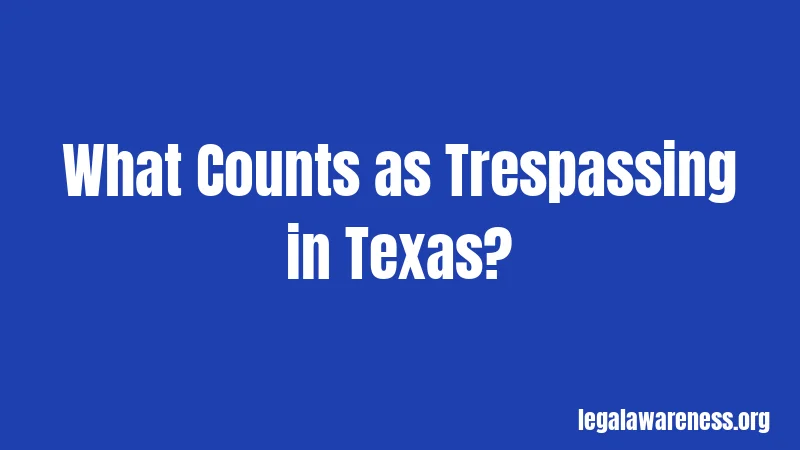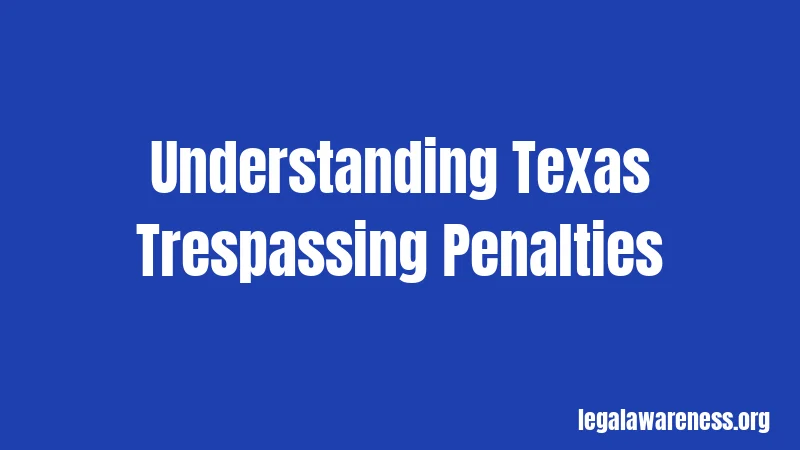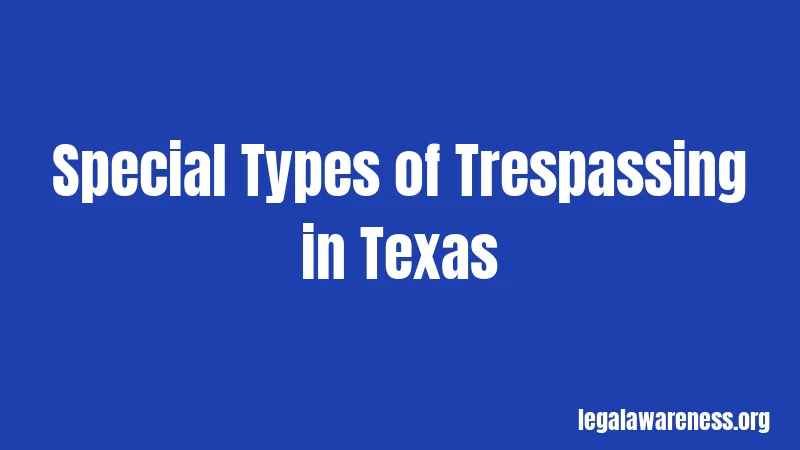Texas Trespassing Laws (2026): Know Before You Step
Most people think trespassing is just a minor offense. They’re wrong.
In Texas, trespassing laws are surprisingly strict, and the consequences can seriously affect your life. You could face jail time, hefty fines, and a criminal record that follows you for years. Here’s what you actually need to know.
What Counts as Trespassing in Texas?

Trespassing is when you enter or stay on someone else’s property without permission. Pretty straightforward, right?
But here’s where it gets complicated. Texas has multiple types of trespassing charges. The specific law applied to your situation depends on the type of property, whether it was fenced, and what notice was given. Let me break this down so it actually makes sense.
Basic Texas Trespassing Laws
Trespassing on Land (Texas Penal Code 30.05)
This is the most common trespassing charge in Texas. You’re guilty if you knowingly enter someone’s land without permission or fail to leave when told to.
Wondering what counts as permission? It needs to be clear and actually given. A sign isn’t automatically enough. The property owner has to communicate it to you directly, through a sign that follows specific Texas requirements, or through fencing that shows notice.
The key word here is “knowing.” You have to know you don’t have permission. If you genuinely didn’t know someone owned the land, that’s different from willfully ignoring a “no trespassing” sign.
Criminal Trespassing of a Habitation
This one hits harder. Entering or remaining in someone’s home without permission is treated much more seriously than trespassing on open land.
If you go into someone’s house, apartment, or occupied structure without permission, you’re committing a more severe crime. Texas takes home invasions seriously because people have the right to feel safe in their own homes.
Understanding Texas Trespassing Penalties

Here’s where things get real. Let’s talk about what actually happens if you get caught.
Simple Trespassing Penalties
For basic trespassing on land, you’re looking at a Class B misdemeanor. That means up to 180 days in jail and a fine up to $2,000.
Honestly, that’s significant. A criminal record from this can affect your job prospects, housing applications, and more. This isn’t just a slap on the wrist.
The penalty can increase to a Class A misdemeanor if you’ve been asked to leave before or if the property is fenced. Class A misdemeanors carry up to one year in jail and fines up to $4,000.
Trespassing in a Home or Occupied Building
This is much more serious. Breaking into someone’s home is a felony in most cases. You’re looking at a state jail felony, which means:
Up to two years in state jail and a fine up to $10,000. But wait, it gets worse. If you enter someone’s home with intent to commit a felony, you’re facing enhanced penalties. We’re talking about years in prison and substantially higher fines.
Trespassing on Property with Weapons
Here’s something that surprises people. If you’re trespassing and carrying a weapon, the charge escalates. Texas doesn’t mess around with armed trespassing.
Bring a gun, knife, or other weapon to someone’s property you’re not allowed on, and your punishment increases significantly. You could face additional charges on top of the trespassing charge.
Notice Requirements in Texas
Okay, this part is actually important. How does property owners give notice?
Texas requires clear, specific notice before trespassing is illegal. The owner can give notice four different ways.
Verbal notice is the most direct. If the property owner tells you to leave, you have to leave. Not complying after they tell you personally is definitely trespassing.
Written notice also works. An official letter, email, or written statement from the owner saying you’re not permitted counts as legal notice.
Visible fencing is another method. But here’s the catch: the fence has to actually show that it’s keeping people out. A broken-down wire fence with gaps doesn’t meet the requirement.
Posted signs are the most common method we see. The sign has to be in a location where someone entering the property would reasonably see it. Small signs hidden in bushes don’t cut it. The sign needs to use specific Texas-approved language mentioning trespassing or hunting.
Special Types of Trespassing in Texas

Trespassing to Hunt or Fish
Texas has specific laws about hunting and fishing on private land. This is a big deal in Texas, where hunting and fishing are major activities.
Entering someone’s private property to hunt or fish without permission is illegal. Even if it’s not posted, you need permission from the property owner. Get caught hunting on someone else’s land, and you’re facing serious penalties plus potential game law violations.
Railroad and Pipeline Trespassing
Walking on railroad tracks or entering restricted pipeline areas is illegal in Texas. These are considered hazardous areas, and companies have the right to protect their property and equipment.
The penalties can be similar to regular trespassing but with additional dangers. You’re risking injury on railroad tracks, which is why these laws exist.
Trespassing in Schools and Public Buildings
Government buildings have special protections. Trespassing in schools, courthouses, or other government buildings can result in additional charges.
If you’re told to leave a public building and refuse, you’re looking at trespassing charges plus potentially disturbing the peace or disorderly conduct charges stacked on top.
Recent Changes to Texas Trespassing Laws
Texas updated trespassing laws in recent years to clarify what counts as proper notice. The changes made it slightly clearer for property owners but didn’t really change what’s illegal.
In 2021, Texas made changes to how notice works for posted signs and other notification methods. The law became more specific about where signs need to be placed and how visible they need to be.
Hold on. This is important to understand. These changes don’t make trespassing legal in any new situations. They just clarified existing laws. Don’t assume old rules no longer apply.
What Happens During a Trespassing Arrest
Let’s say you get caught. What actually happens?
You’ll be detained while police investigate. They’ll ask questions about why you were on the property and whether you knew you didn’t have permission. Anything you say can be used against you.
You have the right to remain silent. Seriously, use it. Don’t try to explain your way out of it on the spot. Wait for a lawyer.
After arrest, you’ll be booked. You’ll provide information and possibly face a bail hearing. Depending on your criminal history and the specific charges, you might be released on your own recognizance or need to post bail.
You’ll then face trial (unless you take a plea deal). This is where evidence gets presented. Did the property have proper notice? Did you actually know you weren’t supposed to be there? Your defense depends on these details.
Defenses Against Trespassing Charges
You might have a valid defense. Let’s look at what actually works.
You had permission. This is the strongest defense. If the owner gave you permission, even verbal permission, that’s a complete defense.
You didn’t know about the notice. If the property was poorly posted and you honestly didn’t see the signs, that’s potentially a valid defense. The property owner has to give proper notice.
You had a legal right to be there. Some people have legal reasons to be on property they don’t own. Utility workers, emergency responders, and others have legal authority.
The property wasn’t properly enclosed. Incomplete or inadequate fencing might mean the property owner didn’t properly notify you. This is a fact-specific defense.
Not sure which defenses apply to your situation? That’s exactly when you need a lawyer. Don’t rely on guesses.
Trespassing on Posted Private Property
Private property owners love their “no trespassing” signs. In Texas, they have the right to protect their land.
Here’s what you need to know. If you see a sign, assume it’s legally valid. Don’t assume you know better. The penalties aren’t worth testing whether the sign meets technical requirements.
Walk around it. Find another route. Respect the property. The sign is there for a reason, and ignoring it can result in criminal charges.
What to Do If You’re Accused of Trespassing
First, don’t panic. You have legal rights and options.
Get a lawyer immediately. Seriously, this is non-negotiable. A criminal record from trespassing follows you forever. It affects jobs, housing, education, and more. Spend money on a lawyer now or deal with consequences for years.
Don’t talk to police without your lawyer present. Don’t try to explain. Don’t apologize. Let your lawyer handle it.
Gather evidence. Do you have photos of the property? Emails showing permission? Witness statements? Give everything to your lawyer.
Stay off the property. Obviously. Don’t make things worse by going back.
How to Legally Enter Private Property
This seems obvious, but apparently it’s not. Many people don’t realize how simple it is to get legal access.
Ask permission. Call the property owner or tenant. Explain why you need to be there. Get clear permission. If it’s important, get it in writing.
Use public access areas. Some properties have public roads running through them. Publicly accessible areas don’t count as trespassing.
Get written consent. If you need to be on someone’s property repeatedly, get a written agreement. This protects both you and the property owner.
Know when you have legal authority. Some jobs give you the right to be on private property. Utility workers, emergency responders, and law enforcement have specific rights.
Trespassing and Self-Defense
Here’s something people often misunderstand. Property owners have the right to use force to protect their property, but there are limits.
In Texas, property owners can use reasonable force to prevent trespassing. But they can’t use excessive force. If someone is simply trespassing but not threatening anyone, deadly force isn’t justified.
Similarly, if you’re defending your property and a trespasser isn’t threatening anyone, you can’t shoot them. The law doesn’t give you unlimited right to use force just because someone is on your land.
This gets complicated fast. If you’re in a confrontation about property access, retreat and call police instead of escalating.
Frequently Asked Questions
Can someone trespass if the fence is broken? Not necessarily. If the fence was properly maintaining a boundary at one time, a temporarily broken section might not eliminate the notice it provides. But if the fence is mostly broken down, it might not count as effective notice. This is fact-specific and depends on the circumstances.
Is trespassing a felony in Texas? It usually isn’t, unless you’re trespassing in someone’s home or occupied building. Basic land trespassing is typically a misdemeanor. Habitation trespassing is a felony.
Can you trespass on your own property that you own the mortgage on? Not in the legal sense. If you own the property (or have a right to occupy it like a lease), you can’t trespass on it. But if your property is in foreclosure and the bank owns it, you might not have the right to be there anymore. Check your mortgage agreement and consult a lawyer.
Do you need a fence to prevent trespassing? No. Fencing helps establish notice, but it’s not required. A clearly posted sign saying “no trespassing” can be enough if it’s visible and uses proper language.
What if someone trespasses on my property? Document everything. Take photos and videos. Report it to police if it happens repeatedly. Talk to your insurance company. Consider legal action. Don’t take matters into your own hands unless someone is actively threatening you.
Now You Know the Basics
Texas takes trespassing seriously. Whether you’re a property owner wanting to protect your land or someone concerned about trespassing charges, understanding these laws matters.
The key takeaway: stay off property you don’t have permission to be on. If you do get charged with trespassing, get a lawyer immediately. The consequences last longer than most people realize.
Got questions about a specific situation? Talk to a Texas lawyer. They can give you advice based on your exact circumstances, which these general laws can’t do.
References
Texas Penal Code Section 30.05 – Criminal Trespass – Official Texas statute defining trespassing and penalties
Texas Parks and Wildlife Department – Trespassing and Hunting Laws – Information about hunting on private property
State Bar of Texas – Find a Lawyer – Official resource to find qualified Texas attorneys
Texas Justice Court Training Center – Criminal Trespass Information – Judicial training materials on trespassing law
Google Scholar – Texas Trespassing Cases – Real court cases interpreting Texas trespassing law
